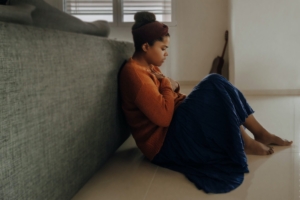People who struggle with anxiety can have an anxiety attack at any time. Symptoms of an anxiety attack can include sweaty palms, shaking, a feeling of dread or of being overwhelmed, nausea, and perspiration. These symptoms can be debilitating and greatly affect a person’s well-being if not dealt with. Santa Monica Christian Counseling can help you manage anxiety attacks, offering tools and support to improve your emotional health and well-being.
 Although it can be unpredictable when an anxiety attack may occur, you can begin to notice specific triggers that make you more vulnerable. For example, stress, conflict, and emotional turmoil can all contribute to anxiety and a potential anxiety attack. When under stress, even simple things like feeling hungry or tired can make an attack more likely.
Although it can be unpredictable when an anxiety attack may occur, you can begin to notice specific triggers that make you more vulnerable. For example, stress, conflict, and emotional turmoil can all contribute to anxiety and a potential anxiety attack. When under stress, even simple things like feeling hungry or tired can make an attack more likely.
While there are things that you can do to calm an anxiety attack once it has begun, there are also self-care practices you can implement to minimize the chance of triggering one in the first place. These preventative steps are not simply good for anxiety but also your overall health.
Cut down on stress
Stress can be the number one trigger of an anxiety attack. Stress comes in many forms. Work tensions, working too many hours with insufficient rest, marriage issues, and other elements can trigger an attack. Stress and anxiety attacks can also come upon you suddenly, with no warning signs.
Reducing stress is easier said than done. Setting firm boundaries and managing your schedule are two crucial steps. For example, it’s possible that work easily becomes more than forty hours, especially if you work from home. Extra work hours as well as the time to do household chores and childcare are easy to miss when calculating your actual time expenditures. It’s challenging, but don’t let responsibility squeeze out free time for interests, relaxing, and recreation.
 If overpacked schedules are part of the problem, refrain from overpacking after work with sports schedules and other extracurricular activities throughout the school year. Use the summer to de-stress and take a break from the routine. Taking a break and reconvening in the fall may be just what your nervous system ordered.
If overpacked schedules are part of the problem, refrain from overpacking after work with sports schedules and other extracurricular activities throughout the school year. Use the summer to de-stress and take a break from the routine. Taking a break and reconvening in the fall may be just what your nervous system ordered.
Stress will always be a natural part of life. Work stress, compounded with family responsibilities, financial stress, and health concerns, can all culminate in an anxiety attack. However, there are ways to combat it. When we take the time to care for ourselves and limit our stress and anxiety, an attack is much less likely to occur.
Give yourself a break
While schedules may not always allow for breaks, a chance to rest mentally, physically, and emotionally from the task at hand will help increase productivity and promote more concentrated focus and attention. Take frequent breaks throughout your day. These breaks can be as simple as taking half an hour for lunch, eating with a friend, going out for coffee, or taking 10 minutes to stretch and listen to a favorite song. Do what you can to incorporate frequent breaks into your regular workday.
It is easy to get wrapped up in work and caring for children and find that time flies by. Soon, several hours have passed, and you haven’t taken a break. After every hour, take a quick brain break. Get a glass of water, take deep breaths, pray, or read a book. Doing something favorable during the work intervals will help you de-stress and give yourself a break.
The key to reducing anxiety attacks is knowing your limitations. Understand that too many work hours are unsuitable for your nervous system. Work longer hours at the beginning of the week to give yourself more full days off at the end of the week.
For example, try to do most of your household and family responsibilities on Monday, Tuesday, and Wednesday. Allow Thursday and Friday to be days to de-stress. Save weekends for family time only. These changes, when added up, will significantly reduce your chance of having an anxiety attack.
Relax when necessary
If your budget and time allow it, make time to do something relaxing. Get a massage, get your hair or nails done. Indulge in a hobby you last did a long time ago. Sometimes, deep breathing and listening to soothing music for twenty minutes will significantly reduce anxiety. It’s essential to take time to relax throughout the day.
 Although it is not always possible, take the time to rest at night when necessary. Do things that will naturally reset not only your nervous system but also your parasympathetic nervous system. The parasympathetic nervous system is where the fight or flight response originates. Get into a dark room and close your eyes. Place a cold washcloth over your eyes for thirty minutes or an hour.
Although it is not always possible, take the time to rest at night when necessary. Do things that will naturally reset not only your nervous system but also your parasympathetic nervous system. The parasympathetic nervous system is where the fight or flight response originates. Get into a dark room and close your eyes. Place a cold washcloth over your eyes for thirty minutes or an hour.
The lack of stimulation of your senses will help restore some of the overstimulation that causes a panic attack. This self-care strategy is a simple way to care for yourself and reset your nervous system, reducing the fight or flight response.
Other forms of therapy, such as float therapy, can also benefit. Float therapy that allows a person to float in large amounts of magnesium will help reset the nervous system because bodies deficient in magnesium are more prone to anxiety attacks. Take care of your physical body, and the nervous system will follow.
Rest
Contrary to popular belief, rest is more than simply sleeping late on a weekend or taking a vacation. Not all rest is physical. Rest is essential because it allows the body to shut out any external stimuli and allows the brain to process any emotions or other issues from the day. It is so easy to get wrapped up in the stresses of traffic, work, and children that we can easily spend twelve to fifteen hours doing activities without thought or a break.
Those who are prone to anxiety attacks must identify the real source of the stress, whether it is boundaries, busyness, or responsibilities, and problem-solve from there. Taking a vacation can help but if it creates extra responsibilities upon return, it might just make stress worse. Find what works for you. Slowing down to rest is essential however you do it. Take that time to do some soul-searching and make a plan. Seek help if necessary.
While resting your physical body is essential, resting your emotional and mental health is also essential. Dr. Saundra-Dalton Smith authored a book called Sacred Rest. In it, she cites seven different places to achieve the best rest.
These other sources of rest include spiritual, mental, and technological, just to name a few. If you take the time to sleep in one weekend but are still overly stimulated by technology, your body will not receive the wholeness it needs to rejuvenate itself.
The body is a natural machine that can repair itself properly. However, bodies that have been abused and, if not rested for proper periods, will malfunction. Not only is it important to get physical rest, but take time to unplug from social media, reduce stimuli such as screens and other technological devices, and enjoy a hobby. When our minds and bodies focus on something other than something that causes stress, it will naturally help our body to relax.
Those who make proper changes and take the initiative to rest, take breaks frequently, reduce stress, and take one day at a time may find physical, emotional, mental, and spiritual benefits.
Getting help
 If you are struggling with anxiety, anxiety attacks, and stress, it may be time to reach out to a counselor for professional help. Contact our offices today and we will make an appointment with one of the skilled counselors in our directory. A counselor will guide you on a sustainable journey that can bring freedom and joy to your life. Santa Monica Christian Counseling is here to support you through every step of the healing process.
If you are struggling with anxiety, anxiety attacks, and stress, it may be time to reach out to a counselor for professional help. Contact our offices today and we will make an appointment with one of the skilled counselors in our directory. A counselor will guide you on a sustainable journey that can bring freedom and joy to your life. Santa Monica Christian Counseling is here to support you through every step of the healing process.
“Depressed”, Courtesy of Joice Kelly, Unsplash.com, CC0 License; “Mountain Highway”, Courtesy of Matt Hanns Schroeter, Unsplash.com, CC0 License; “Woman in Watercolor”, Courtesy of Cosmiiccreations, Pixabay.com, CC0 License; “Worried”, Courtesy of geralt, Pixabay.com, CC0 License



